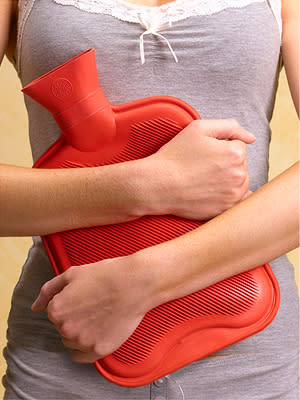Got PMS? 8 Misery Relievers That Really Work

Docs define premenstrual syndrome (PMS) as having symptoms that interfere with normal life and relationships, beginning about 5 days before your period and lasting as long as 4 days after it begins. Some women with PMS (at least 1 in 20) define it as 4 days of hell. (Their partners and families may agree.) Others define it as Perpetual Munching Spree, Pardon My Sobbing, or Pissy Mood Syndrome. WHATever! Next time you're PMS-ing, try one of these remedies to lift your spirits, ease your aches, and deflate your ankles as well as make you feel more like yourself and less like your evil twin.
Symptom | Remedy |
Bloating and swelling | Limit salty foods for as much as 2 weeks before your period starts. Take this quiz to find out how sodium savvy you are. |
Cramping | Exercise. Really. Do anything aerobic (dance, bike, jog, play singles tennis) for at least 30 minutes most days of the week . . . and not just before your period. It works. And, hey, you'll be fitter and firmer instead of doubled over. |
Backache, tense muscles | Take a warm bath, or use a heating pad to relax tense muscles. Heat helps cramping, too. |
Depression | Avoid alcohol the week before your period. Exercise, too, because it releases mood-lifting endorphins, those feel-good hormones that reduce pain and improve your sense of well-being. |
Food cravings | Eat smaller meals more often. Can't get enough chocolate? You may be low on magnesium. Eat more spinach, and be sure your multivitamin delivers at least 100 milligrams of magnesium. |
Stress | Do yoga. Use relaxation techniques -- they don't have to be complicated; a few minutes of deep breathing several times a day will do it. And try burning a saffron-scented candle. Studies show that inhaling the fragrance of saffron for 20 minutes can decrease cortisol, a key stress hormone, before and during your period. |
Breast soreness | Cut back on caffeine, but taper off slowly to avoid a caffeine-withdrawal headache. Wear a more supportive bra than you usually need. Still achy? Try ice packs or heat, such as soaking in a hot bath. |
General yuckiness | Drink more low-fat or skim milk, eat calcium-rich foods, and take a calcium pill daily. A vitamin D supplement may help, too (you probably need more anyway; up to 75% of people do). Research shows that women who get plenty of these nutrients have about half the risk of PMS as those who get the least. |
If That's Still Not Enough, Do 2 of These 3 Steps
1. Track your symptoms. Feel like your PMS never really goes away? It could be something else, like a thyroid condition or an allergy. Keep a daily diary of your physical and emotional issues for 2 to 3 months. If you feel lousy most of the time, and worse a few days before your period, see your doc, and take your diary along. It will help both of you spot any patterns in your complaints.
2. Consider an Rx. About 5% to 8% of women have premenstrual dysphoric disorder (PMDD). That's medspeak for PMS that's so severe, you can't go about your normal life. Fortunately, many women are helped by various medications, including antidepressants and oral contraceptives, though it often takes some trial and error to find the right one for you. Get the facts on depression and how it can be successfully treated.
3. But don't bother with any of these: evening primrose oil, St. John's wort, and reflexology. No matter what you've heard or read elsewhere, studies show they have no effect on PMS. Save your money for things that do.
Get More Healthy Tips on RealAge
